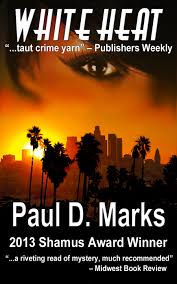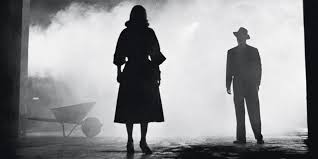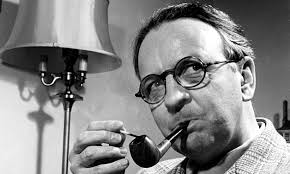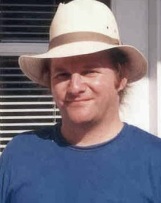It’s our great pleasure to have Paul D. Marks, Shamus Award-winning author on MMO today. Read about his writing process, how to write cinematically, the difference between noir and mystery. . .and much more! Check it out!

MMO: White Heat won the Shamus Award back in 2013. I really dig the setting (Los Angeles during the Rodney King riots) as well as Duke Rogers (the P.I. protagonist). Did you have the setting/context in mind first, or the character? How did that whole book “come together”?
Paul: It’s kind of like the chicken and egg question, isn’t it? And after all this time and so many words under the bridge also a little hard to remember. But setting and context are always important to me. People have said that Los Angeles (in particular) is like another character in my books and stories. I think the character of a city influences the characters and the actions they take. The L.A. atmosphere/culture drives what my characters do and say, at least to some extent. While people have a lot in common, they’re different in L.A. than Manhattan or Wichita or Macon. So, add to that the acquittal of the police officers in the Rodney King beating trial. That and the subsequent riots were events that deeply scarred and shaped Los Angeles in the 1990s, and even to today. Having lived in Los Angeles during that era, I wanted to capture that time and place and tell people about it in a way that wasn’t preachy. And what better way to do that than to put my P.I. in the middle of it?
The other spark (no pun intended) for the story was the Rebecca Schaeffer murder. She was an up and coming actress, who was murdered by a fan who had hired a P.I. to find her physical address in pre-internet days. She was expecting a script delivery that day and opened the door not knowing that a stalker would be there, gun in hand. I wondered about the P.I. who found that address for her killer and what he/she must have felt. So those are the two sides of the story, Duke, the P.I., and the King riots, coming together to make White Heat.

MMO: Not to spoil anything, but there are some very clipped, intensely dramatic italicized sections in White Heat that serve to heighten the tension. How’d you come up with that?
Paul: I’m glad you think they were intense and dramatic. My purpose in doing those sections was to give a heightened sense of being there. They’re written, as you say, in clipped, staccato prose and also in the present tense to really (hopefully) bring the reader into the moment and feel the intensity and drama that the character is feeling at that moment. Sort of to become the character for those sections and totally be inside his head. There was an old TV show called You Are There that put the viewer into historic situations. This is my version of that – you are there with Duke, seeing the situation live.

MMO: In all your books—White Heat, Vortex, and L.A. @ Late at Night—I’ve noticed how cinematic your writing is. Talk about where (and how) that came about.
Paul: Well, my background is in screenplays, script doctoring, so naturally my writing gravitates towards that style. It can be a good thing because I think screenwriting taught me story structure and to be visual. But it can also be a handicap in that I had to work hard to fill out my descriptions more and not use an omnipotent POV like movies do. And I’m a big movie buff, especially film noir (particularly the golden age of film noir in the ’40s and early ’50s) and thrillers, so I tend to play out my storyline like a movie in my head as I’m writing. And sometimes I’ll even write out my first draft in screenplay format just to get the story down.

MMO: I’m not terribly interested in genre-labeling, but I would say that White Heat is a P.I. mystery, while Vortex is a straight-up noir thriller. Explain some of the similarities and differences between these two genres. And, as a writer, do you have a preference? How about as a reader?
Paul: I’ll give you that Vortex is a straight-up noir thriller. But I’d also say that White Heat is noir as well, though it does have more “straight” mystery elements than Vortex. To me, the thing that most makes something noir is not rain, not shadows, not femme fatales, not slumming with lowlifes. It’s a character who trips over their own faults: somebody who has some kind of defect, some kind of shortcoming, greed, want or desire…temper or insecurity, that leads them down a dark path, and then his or her life spins out of control because of their own weaknesses or failings. To this end, White Heat falls into this category because Duke’s weakness for quick money sets the plot in motion. But since we don’t know who the bad guy is and Duke has to figure that out it also has that whodunit element. Whereas Vortex has a darker, more ambivalent tone, and Zach, the main character, his problems are totally brought on by his own weaknesses. As a writer I like both and maybe that’s why WH is a little of both. And ditto as a reader: I like to read a variety of things depending on my mood. My favorite writers are Raymond Chandler and Ross MacDonald, who are both straight mystery writers. And James Ellroy, who is more noir. And David Goodis, who is totally noir.

MMO: In addition to publishing a collection of hard-and-soft-boiled stories, you’ve had a short story nominated/short-listed for the Macavity Award. Explain to other writers out there why writing short stories is a) fun and b) worthwhile.
Paul: I’ve had over thirty short stories published now in a variety of magazines, anthologies and the like. But one of my many goals had been to break into Ellery Queen and I did with my story “Howling at the Moon.” It was nominated for both the Anthony and Macavity Awards in 2015, as well as coming in #7 in Ellery Queen’s Readers Poll Award, so all of that was very cool.
Why short stories are Fun: Immediate gratification. There’s a certain immediate gratification in writing short stories. You can finish them faster (usually than novels) and get the instant “joy” of having a completed work – and often sell them and see them in print faster than a novel. They’re like little puzzles that you fit in all the pieces and feel a sense of satisfaction when you make them fit.
Why short stories are Worthwhile: Stories help you hone your craft. In some ways they’re harder than writing novels. You really need discipline to make everything work right in a confined space. They’re also a way to get your name out there. Lots of little markets (some non-paying, some token payment) are willing to take an unpublished writer. They get exposure for your writing. They’re also a good outlet for some ideas that might not have enough meat on them to make a novel. And you can explore different styles, genres and characters and sometimes realize that you want to pursue a novel length work after discovering a story and character you like in a short story. And I like the challenge and discipline of squeezing a thousand things into a tiny box. There’s really no downside to writing stories. I like doing both novels and short stories.

MMO: Name three writers that made you want to write, and why.
Paul: How about three writers who made me want to write mysteries and/or noir, ’cause I can’t remember far enough back to who might have inspired me to want to write in the first place. But my initial interest was in writing for film, so my early influences are probably screenwriters. From there I gravitated to prose. It’s not very original but Raymond Chandler would be number one with a bullet on my list. I always liked film noir and mystery-suspense-thriller movies. And, of course, I’d seen The Big Sleep with Bogart many times. So eventually I got around to reading the book it was based on. From there I dove into more Chandler. The same thing happened with another Bogart movie: I’d seen Dark Passage several times and finally decided to check out the book it was based on. That turned me onto David Goodis. My favorite of his is Down There, a.k.a. Shoot the Piano Player. I really dig that book, but for me the movie disappoints.

MMO: Give aspiring writers some brief advice.
Paul: Don’t give up. Keep writing, you will become a better writer through experience and practice. Don’t give in to writers block, just sit down and write, regardless of what comes out. Fix it later. And don’t make excuses about why you don’t have time to write. I know a lot of people who say they’re writers or want to be…but they don’t write anything or they write very little. It’s not easy, but a writer is someone who has to write and can’t live without it.
MMO: Tell me when I can expect the next Duke Rogers book.
Paul: Oh, the long and winding road and tale of woe that is Broken Windows, the sequel to White Heat. Broken Windows was tied up with an agent for a long, long time. Unfortunately, she never did anything with it, never sent it out. I think she’d gotten sick and it sort of languished. I’ve got it back now and it’s done, so hopefully it’ll be out before the next millennium.

MMO: Plug/pimp your next writing project.
Paul: Lots of stuff coming up. My story “Deserted Cites of the Heart” comes out in Akashic’s St. Louis Noir anthology on August 2nd. Coast to Coast: Private Eyes from Sea to Shining Sea, which I co-edited, is the second book in the Coast to Coast anthology series and should hopefully be out by the end of the year. And one of the stories in the first volume is up for a Shamus Award this year. I’ll have a short story in volume 2, as well as it being filled with great stories by a bunch of great writers. I’ll have stories out in both Ellery Queen and Alfred Hitchcock Mystery Magazines, though they’re not scheduled yet so I can’t give you dates. And, of course, I’m working on a couple of novels. Not Duke Rogers stories, but standalones. Some good stuff, I think, but I’m not ready to say exactly what they are just yet. My plate’s always full, but sometimes I’m just too busy to get to some of the things on it. I guess I need to go back to my answer about writers needing to write – I need to take my own advice on that.
Thanks for having me, Max. It’s been a blast.

Author Bio
Paul D. Marks is the author of the Shamus Award-Winning mystery-thriller White Heat. Publishers Weekly calls White Heat a “taut crime yarn.” And Midwest Book Review says “White Heat is a riveting read of mystery, much recommended.” His story Howling at the Moon is short listed for both this year’s (2015) Anthony Award and Macavity Award for Best Short Story. It was published in the November 2014 issue of Ellery Queen Mystery Magazine and came in #7 in their Reader’s Poll Award. And he just sold another story, Ghosts of Bunker Hill, to Ellery Queen (publication date to be announced later). His story Fade Out will be in an upcoming Akashic’s Mondays Are Murder in August. And his latest noir-thriller, Vortex, will be out in early summer, 2015. He is the co-editor of the anthology Coast to Coast: Murder from Sea to Shining Sea, coming in 2015 from Down and Out Books. Paul is also the author of over thirty published short stories in a variety of genres, including several award winners. Five of his stories can be found in the collection LA Late @ Night. According to Steven Bingen, author of MGM: Hollywood’s Greatest Backlot, he [Paul] has the distinction, dubious though it might be, of being the last person to have shot a film on the fabled MGM backlot before it bit the dust to make way for condos.

Thanks for articulating difference between noir and mystery, Paul. I have been fuzzy on that for years.
MMO readers should check out White Heat by Paul. It is a taut, gritty PI tale.
Cheers for being on today!
LikeLiked by 2 people
Thanks, MMO. It’s a definition that makes sense…at least to me.
LikeLike
What an excellent and revealing interview! I think I most enjoyed the red print about the character who trips over his own faults, a defect, a shortcoming, want or desire that leads them down a dark path. That encompasses so many kinds of plots and character driven novels. It is a big piece of life and people all trip over themselves at some time or other, but a few trip and fall over the edge. They’re in the news every day and that makes news stories a fertile ground for novel plots and characterization. It was interesting Paul used the news and atmosphere of L.A. for his work. Some cities have a specific feel of their own that is uniquely identifiable and becomes a character in itself for a book. I wish Paul the best. Thanks for this great interview.
LikeLike
Really good interview, Max. Marks is an interesting and obviously well informed and talented writer. Yeah, the mystery/noir thing has always been fuzzy to me, too. I’m not sure you can be absolute in setting them apart from one another. Sure, some stories/books are strict mystery, but in many, many others there’s a fine line that’s crossed and recrossed many times. At least that’s my take on it.
Thanks for an interesting post!
LikeLiked by 1 person
Reblogged this on e. michael helms and commented:
A current Shamus Award finalist picks the brain of a former Shamus Award winner! Don’t miss Max Everhart’s interview with Paul D. Marks at Motive Means Opportunity!
LikeLiked by 1 person
Having no noir writing talent I admire it in others. i didn’t realize that the Rebecca Schaeffer killing and the Rodney King incident were contemporaneous. What a tragic time in LA history. Reading your descriptions made me feel the heat rising off the streets and smell the smoke in the air. Well done.
LikeLiked by 1 person
I love that you’ve been so prolific and never allowed yourself to be defined by one particular medium: I.e., books, film short story. You’re an inspiration!
LikeLike
Thanks, Nancy. Well, it’s all writing and most of the same principles apply whatever the medium. Have enjoyed your books too, as you know. And somehow I missed your response when I was going through the comments before.
LikeLiked by 1 person
I love the short form. It’s a nice change from writing novels, but like you said, sometimes it’s harder to master. Really enjoyed the interview.
LikeLiked by 1 person
Thanks for your comments, E. Michael. And you’re right about the fine line being crossed and recrossed. And for reposting. I appreciate it.
LikeLiked by 1 person
Thanks, Paul. I’m currently writing the Mac McClellan Mystery series. Present day, based along the coast of the Florida panhandle (where I grew up). The series started with Seventh Street Books (#1&2, affiliated with Random/Penguin for marketing & distribution). It’s now with Camel Press, signed for four books with Camel. I’ve been writing some short-short noir type stories on MMO. Post WWII Las Vegas, ex-Marine PI named Dinger. Hoping to accumulate enough for a collection/book. Later, maybe a novel. Who knows?
Thanks for the interesting interview, and belated congrats on your Shamus!
–Michael
LikeLike
Thanks, Kait. It was a tough time in LA history, but I think not just for LA but the country as a whole. And Rebecca Schaeffer was killed a few years before the King incidents. She was just the inspiration for the character in White Heat. And speaking of smelling smoke in the air, I don’t know where you are but if you’re in LA today there’s smoke everywhere from the fire.
LikeLiked by 1 person
Thanks for your comment, Sue. I agree, short stories are a nice change from novels. I really like doing both and the challenges of both.
LikeLiked by 1 person
I always love hearing Paul’s take on writing, the noir genre, and L.A. And wow, mentioning the Rebecca Schaffer murder really brought me back. I was heading to UCLA that year and remember being really shaken by it, at the ease with which the stalker found her. Great interview!
LikeLiked by 1 person
Thanks, Sarah. He found her with ease and that was before the internet and personal computers. Today it would be much easier. We have no privacy left.
LikeLike